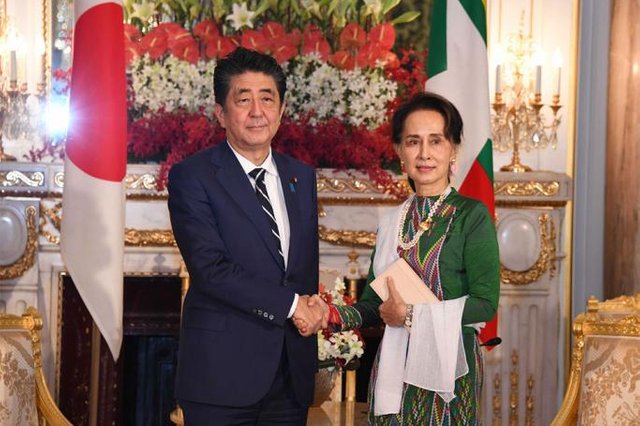
According to the Reuters news report dated 23/10/2019, Japanese Prime Minister Shinzo Abe has called for State Councillor of Myanmar, Aung San Suu Kyi, and the de facto leader of the country, to create favourable conditions in Rakhine to enable the return of hundreds of thousands of Rohingya refugees sheltering in Cox’s Bazar. Myanmar’s State Counsellor Aung San Suu Kyi met with Japan’s Prime Minister Shinzo Abe at Akasaka State Guest House in Tokyo on Monday, October 21, 2019.
In this meeting with Suu Kyi in Tokyo, the Japanese prime minister also placed great emphasis on taking appropriate measures to address the reported human rights violations in Rakhine.
“With regard to the alleged human rights violations in Rakhine State, it is indispensable that the Myanmar government and military promptly take appropriate measures according to the recommendations of the Independent Commission of Inquiry,” Shinzo Abe told Suu Kyi, according to the Japanese Foreign Ministry on Monday.
The Myanmar leader is currently in Japan to attend the coronation of the new Japanese emperor.
“It is essential to create an environment conducive to the repatriation of displaced persons,” the Japanese prime minister said, giving assurances of his country’s “maximum” support to improve the situation in Rakhine State.
State Councillor Suu Kyi responded that she intends to address the Rakhine issue properly and will not hesitate to take necessary measures.
Previously, PM Abe also told the same to the Myanmar Chief Senior General Min Aung Hlaing.
We, on behalf of all Rohingya people, thank from our bottom of our hearts to PM Abe for his concern on Rohingya issue. We sincerely hope for his assurance of his country’s “maximum” support to improve the situation in Rakhine State.
However, we would like to ask to Your Excellency Mr Abe the following questions: -
1. Why your government does not use officially the term Rohingya which is used in Japanese media? Do Your Excellency think that we, Rohingya as a people, do not need the right to self-identification?
2. Why does your government’s interest in the human rights situation of the Rohingya not go beyond “grave concern” although Myanmar intensified its campaign against the Rohingya after August 2017 to loot, rape, kill, and burn, which detailed the patterns of a campaign of slaughter By the UN report?
3. Why does Japan not like to admit that the atrocities in Rakhine are established not merely allegations of Human Rights violations?
4. Why does Japan caution the world against pushing Myanmar for the reason that the Burmese democracy is building and fragile without mentioning the protection of diversity?
5. Why does Japan promise it will “think together” and “fully support the nation-building’” of Myanmar while the Rohingya villages in Rakhine were still burning in 2017?
6. Why do the members of Japanese business community in Myanmar always say that they are proud that they are contributing to nation-building in Myanmar?
7. Why does Japan reiterate that the problem of Rakhine is complex, implying that the critique of Myanmar is unprofessionally simple?
8. The Army Chief of Myanmar told that they are going to accomplish their unfinished mission of the Second World War and are you also going to accomplish your unfinished mission of 1942 in Rakhine?
The Burmese army is bolstering its solidarity with the NLD democratic government of Myanmar, and Japan is in harmony with that Myanmar. Myanmar, both its government and military, insists that there is no indigenous group identified as the Rohingya and that those Muslims calling themselves Rohingya should instead be called Bengalis — illegitimate interlopers from the Bengal area. Denying any Burmese persecution of the Rohingya, Myanmar procrastinates in its response to the deterioration of human rights in Rakhine by setting up the Kofi Annan Commission, the Advisory Board, and the Independent Investigation Commission. Aung San Suu Kyi says the country has only just started on its path toward democracy (i.e., since the 2015 election), and has little time to handle the many complex problems. Myanmar explains its doubtlessly planned campaign against the Rohingya as an anti-terrorist campaign it was forced to start against its own will.
Thus, we, the Rohingyas, here would like to request to Your Excellency is that:-
Please change your government’s pro-Myanmar approach. Your private sector should begin implementing the U.N. Guiding Principles on Business and Human Rights, which provides that business enterprises have a responsibility to respect human rights by avoiding causing or contributing to human rights abuses through their own activities, and seek to prevent abuses that are directly linked to their operations by their business relationships. That would mean doing no business with Myanmar companies that have ties to the military. Irresponsible investment will only embolden the Myanmar government and military to further whitewash the heinous acts committed against the Rohingya.
At the same time, your government should cooperate with the international community in pursuing accountability for the Myanmar military’s crimes against the Rohingya. This includes voting in favor of Myanmar-related resolutions at the U.N. that press Myanmar to change its behavior, demanding access for the U.N. special rapporteur and new investigative mechanism, and contributing to all efforts aimed at holding the Myanmar military accountable for its gross violations of human rights.
The article is written by Aman Ullah. He can be reached here.
Posted from my blog with SteemPress : https://rohingyavision.com/mr-prime-minister-please-change-your-pro-myanmar-approach/